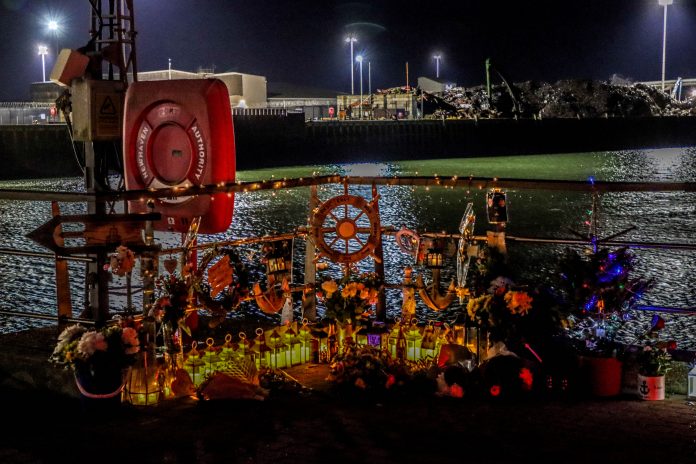The The Marine Accident Investigation Branch (MAIB) have released their report on the Joanna C incident that happened on the November 21, 2020.
The following is the Synopsis from the MAIB with a link to the full report attached
Our thoughts are with the family and friends of those involved.
The MAIB have said
At about 0515 on 21 November 2020, the scallop dredger Joanna C capsized and later sank south of Newhaven, England. Only one of the three crew survived.
Joanna C’s crew were hauling in the fshing gear when the starboard dredge became snagged on a line of whelk pots and the vessel capsized rapidly. The mate was on deck and was thrown into the water, but the skipper and deckhand were trapped inside the initially foating, inverted, hull. The skipper managed to escape and joined the mate in the water before the vessel sank with the deckhand still trapped inside. The skipper was recovered alive after about three hours in the water; the body of the trapped deckhand was recovered from the wreck by divers the next day and, on 14 December 2020, the missing mate’s body washed up on Bexhill beach.
The investigation found that Joanna C had very low reserves of positive stability and the snagging initiated a rapid heel to starboard that the vessel could not recover from, nor did the crew have time to respond effectively. Joanna C’s stability had been severely eroded by modifications and was insufficient to meet the required minimum criteria. The opportunity to detect this stability deficiency was missed when data from an inclining experiment in 2019 was not analysed and this omission was not followed up. Joanna C’s crew were therefore free to operate the vessel with inadequate reserves of stability.

After the capsize, Joanna C’s float free liferaft was released, but did not inflate because of insufficient buoyancy to trigger the inflation mechanism. The failure of the liferaft to inflate and come to the surface adversely affected the survival time of the crewmen in the water. The liferaft was not constructed or required to meet any industry minimum standard for buoyancy in the uninfected state, necessary to assure automatic inflation. As a result, an urgent MAIB safety recommendation was made to the British Standards Institution to propose the introduction of a minimum buoyancy requirement for liferafts certified by the International Organization for Standardization. The International Organization for Standardization’s technical committee has subsequently included a buoyancy requirement for liferafts designed for float free launching in its revised liferaft standard. In light of this action, no recommendations have been made in this report regarding the buoyancy of uninflated liferafts.
A safety recommendation has been made to the Maritime and Coastguard Agency to ensure that stability requirements for small fishing vessels are applied as intended and that, where stability checks are required, fishing operations should be suspended until a vessel has been satisfactorily assessed.
If you wish to read the report in full you can do on this link
https://assets.publishing.service.gov.uk/media/62b06b85d3bf7f0af9463493/2022-7-JoannaC-Report.pdf





















